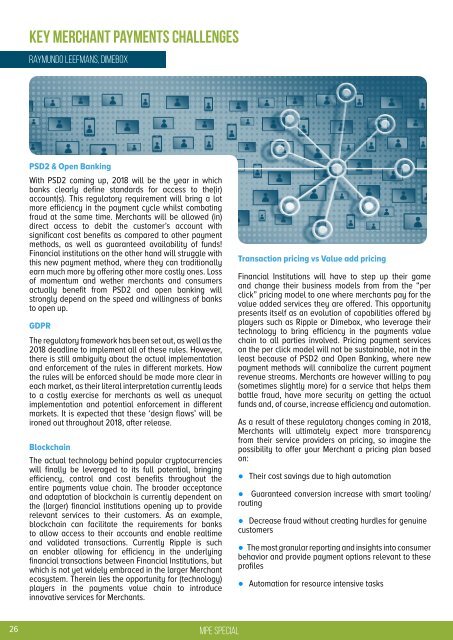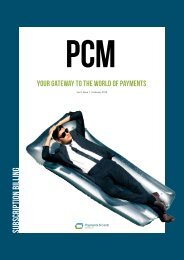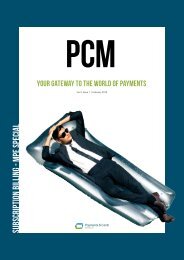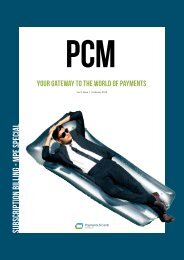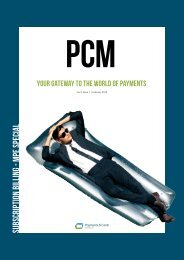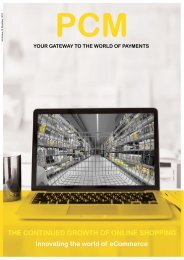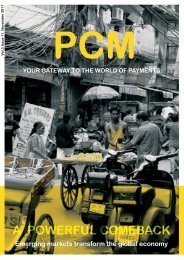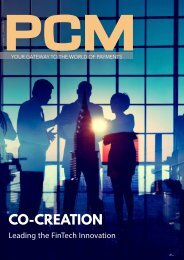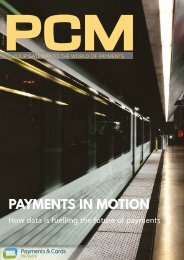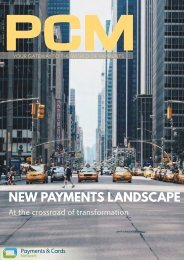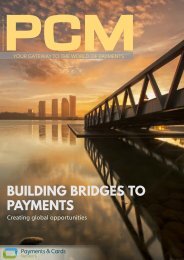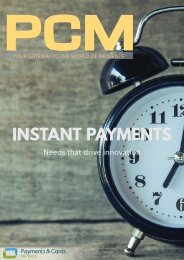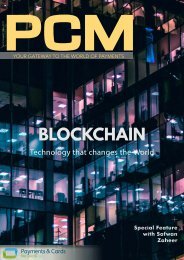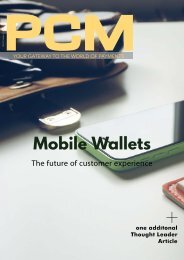You also want an ePaper? Increase the reach of your titles
YUMPU automatically turns print PDFs into web optimized ePapers that Google loves.
Key Merchant Payments Challenges<br />
Raymundo Leefmans, Dimebox<br />
PSD2 & Open Banking<br />
With PSD2 coming up, 2018 will be the year in which<br />
banks clearly define standards for access to the(ir)<br />
account(s). This regulatory requirement will bring a lot<br />
more efficiency in the payment cycle whilst combating<br />
fraud at the same time. Merchants will be allowed (in)<br />
direct access to debit the customer’s account with<br />
significant cost benefits as compared to other payment<br />
methods, as well as guaranteed availability of funds!<br />
Financial institutions on the other hand will struggle with<br />
this new payment method, where they can traditionally<br />
earn much more by offering other more costly ones. Loss<br />
of momentum and wether merchants and consumers<br />
actually benefit from PSD2 and open banking will<br />
strongly depend on the speed and willingness of banks<br />
to open up.<br />
GDPR<br />
The regulatory framework has been set out, as well as the<br />
2018 deadline to implement all of these rules. However,<br />
there is still ambiguity about the actual implementation<br />
and enforcement of the rules in different markets. How<br />
the rules will be enforced should be made more clear in<br />
each market, as their literal interpretation currently leads<br />
to a costly exercise for merchants as well as unequal<br />
implementation and potential enforcement in different<br />
markets. It is expected that these ‘design flaws’ will be<br />
ironed out throughout 2018, after release.<br />
Blockchain<br />
The actual technology behind popular cryptocurrencies<br />
will finally be leveraged to its full potential, bringing<br />
efficiency, control and cost benefits throughout the<br />
entire payments value chain. The broader acceptance<br />
and adaptation of blockchain is currently dependent on<br />
the (larger) financial institutions opening up to provide<br />
relevant services to their customers. As an example,<br />
blockchain can facilitate the requirements for banks<br />
to allow access to their accounts and enable realtime<br />
and validated transactions. Currently Ripple is such<br />
an enabler allowing for efficiency in the underlying<br />
financial transactions between Financial Institutions, but<br />
which is not yet widely embraced in the larger Merchant<br />
ecosystem. Therein lies the opportunity for (technology)<br />
players in the payments value chain to introduce<br />
innovative services for Merchants.<br />
Transaction pricing vs Value add pricing<br />
Financial Institutions will have to step up their game<br />
and change their business models from from the “per<br />
click” pricing model to one where merchants pay for the<br />
value added services they are offered. This opportunity<br />
presents itself as an evolution of capabilities offered by<br />
players such as Ripple or Dimebox, who leverage their<br />
technology to bring efficiency in the payments value<br />
chain to all parties involved. Pricing payment services<br />
on the per click model will not be sustainable, not in the<br />
least because of PSD2 and Open Banking, where new<br />
payment methods will cannibalize the current payment<br />
revenue streams. Merchants are however willing to pay<br />
(sometimes slightly more) for a service that helps them<br />
battle fraud, have more security on getting the actual<br />
funds and, of course, increase efficiency and automation.<br />
As a result of these regulatory changes coming in 2018,<br />
Merchants will ultimately expect more transparency<br />
from their service providers on pricing, so imagine the<br />
possibility to offer your Merchant a pricing plan based<br />
on:<br />
● Their cost savings due to high automation<br />
● Guaranteed conversion increase with smart tooling/<br />
routing<br />
● Decrease fraud without creating hurdles for genuine<br />
customers<br />
● The most granular reporting and insights into consumer<br />
behavior and provide payment options relevant to these<br />
profiles<br />
● Automation for resource intensive tasks<br />
26<br />
<strong>MPE</strong> SPECIAL<br />
<strong>MPE</strong> SPECIAL


